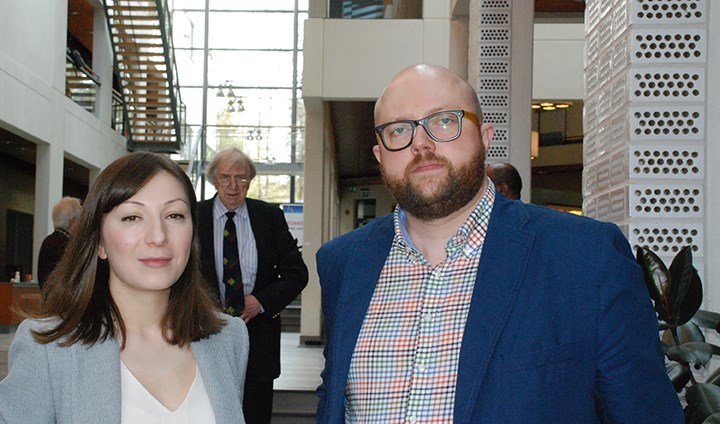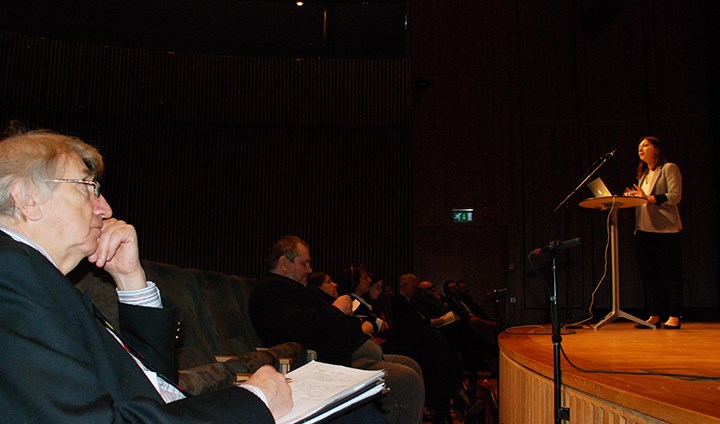Örebro and Aston in premiere event on migration

Jelena Obradovic-Wochnik and Michal Krzyzanowski.
Two lecturers on the podium at the School of Music at Örebro University, spoke of one of the major challenges of our time – migration. By doing so, they also helped the very recent cooperation agreement between Örebro University and Aston University to take concrete form.

A historic occasion, noted Örebro University’s Vice-Chancellor Jens Schollin as he opened the conference Migration and Diversity.
“This event gives us the opportunity to present to one another what we do and to provide an international perspective. And to learn from one another,” he said.
Jonathan Tritter from Aston University in Birmingham on his part pointed to the necessity for academia to “come down from its ivory tower” and get involved in society and in the community.
Manifesting the collaboration between the two universities, Jelena Obradovic-Wochnik from Aston and Michal Krzyzanowski from Örebro shared their experiences on today’s Europe and migration.
Jelena Obradovic-Wochnik has studied the actions taken by various networks of volunteers in Serbia to support the thousands of refugees that made their way into the country in the late summer of last year, with Western Europe as their desired final destination.
“At the same time as Hungary closed its borders, 8,000 refugees arrived in Serbia every day. Few international organisations had any presence there. Instead, local networks took action, together with volunteers from other countries,” said Jelena Obradovic-Wochnik.
Family and friends stepped in
“We are the real Europeans” became a slogan among many of the solidarity networks. Here, Jelena Obradovic-Wochnik saw a connection between people’s response to the current situation and past events. Following the wars in the 1990s, one million refugees received help and support in Serbia from families and friends. The civil society did what the authorities were unable to do. In the present-day solidarity networks there is also, according to her, a link to protests against neoliberal political movements in general.
The Aston researcher’s hometown of Birmingham has a long history as a place of refuge. Quakers and Irish immigrants have in the past sought a new life here, and today immigrants come from countries such as Somalia and Eritrea. People of Pakistani descent make up the largest ethnic minority group in the city.
“Birmingham has a tradition of welcoming refugees and when compared to other cities in the UK, Birmingham comes out top for cultural diversity. There are also similarities with Serbia in terms of solidarity movements,” she said.
Described as an invasion
Michal Krzyzanowski compared Sweden and Poland and described how the media and politicians respond to and communicate today’s flow of refugees to Europe. He described Sweden as a traditionally open country with a history of immigration, controlled by long-term regulations.
“In Poland, emigration has always been the main issue. In the last year, this trend has been reversed, moving from zero immigration to what is, by some, described as an invasion,” he said.
Michal Krzyzanowski gave examples of how the Polish top politician Jaroslaw Kaczynski, representative of the government party Law and Justice, introduces openly xenophobic views into the political debate, with some wordings taken directly from classic anti-Semitic propaganda. In Poland, this harsh attitude is also reflected in the way in which the media describe refugees. The same type of arguments are also used in Sweden, but in more marginal channels, for instance on the website Avpixlat.
A panel discussion with representatives of Swedish authorities, responsible for receiving and assisting refugees in Sweden, concluded the conference.
“We have a new society and it will never be what it once was,” was the closing remark from Jens Schollin.
Text: Maria Elisson
Translation: Charlotta Hambre-Knight
Photo: Sakher Alattar
